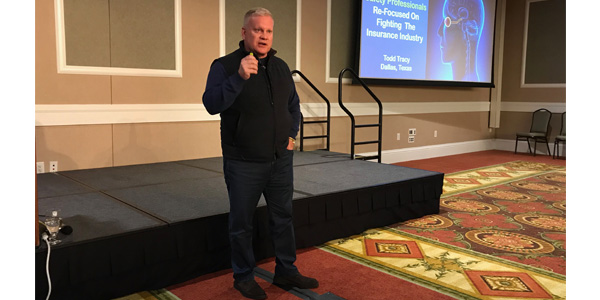
Attorney Todd Tracy is on a mission to get insurance companies to stop meddling in collision repair work, and he believes that filing class-action lawsuits on behalf of multiple body shops is the wrong way to do it.
During a Feb. 17 presentation at the Midwest Auto Body Trade Show in Altoona, Iowa, Tracy explained that he wants to represent body shops in individual lawsuits against insurance companies for short-pay grievances.
“I think class action is the wrong way to go,” Tracy said. “The insurance companies start squealing when they have to handle multiple cases. And besides that, do you know who wins on a class action? The lawyers, the companies and the [expert witnesses]. Do you know who gets screwed on class actions? The clients.”
He reminded collision repairers in the audience that some states allow for treble damages, which is triple the amount of a plaintiff’s actual losses.
“If you have $25,000 of short pay with Travelers and you have $17,000 with Geico and you have $12,000 with State Farm, it adds up real quick,” Tracy added. “ … When you’re multiplying everything by three, it turns into real money real quickly.”
When a shop owner asked Tracy if he would agree to gag-order settlements in the lawsuits, Tracy said he would, but only for the dollar amounts, “because I don’t think that’s anybody’s business.” His goal is to expose insurance companies’ behavior to the light of day.
“I never sign confidentiality agreements with respect to gag orders [for] cause of action, because I think that’s abhorrent, frankly,” Tracy said. “We’ve seen what happens when you start covering up safety defects.”
When he elaborated on his point, Tracy didn’t mince words.
“If you all want to just take the money and [sign a gag order], you’d be hiring the wrong lawyer, because you owe it to mankind to let them know that these guys are @$%*,” Tracy said.
Tracy’s presentation was titled “Getting Vehicle Safety Professionals Refocused on Fighting the Insurance Industry,” and he asserted that shops need to arm themselves with some new strategies for taking on the insurance carriers – starting with how they characterize the auto body profession.
“In the spirit of change, you are no longer vehicle repairmen,” Tracy said. “You’re no longer vehicle body shops. You are vehicle safety professionals. You’re on the front lines of safety for God’s sakes.
“Your vehicle crash labs are responsible for returning families to their homes at night. And guess what: You don’t get the luxury of having a bad day at work. If you’re a barista at Starbucks, so what if you make somebody a crappy cup of coffee. … But when you guys make mistakes, people’s lives are at stake.”
He encouraged the auto body industry to adopt this mission statement: “As vehicle safety professionals, we have a moral and legal obligation to ensure that our customers make it home safely because our vehicle repairs were performed properly, responsibly and ethically.”
Insurance carriers, he added, are undermining that mission.
“I firmly believe this, and I will go to my dying grave with this: By dictating improper vehicle repairs for decades, insurance companies have seriously injured and killed thousands of your customers because they are driving around in time bombs.”













